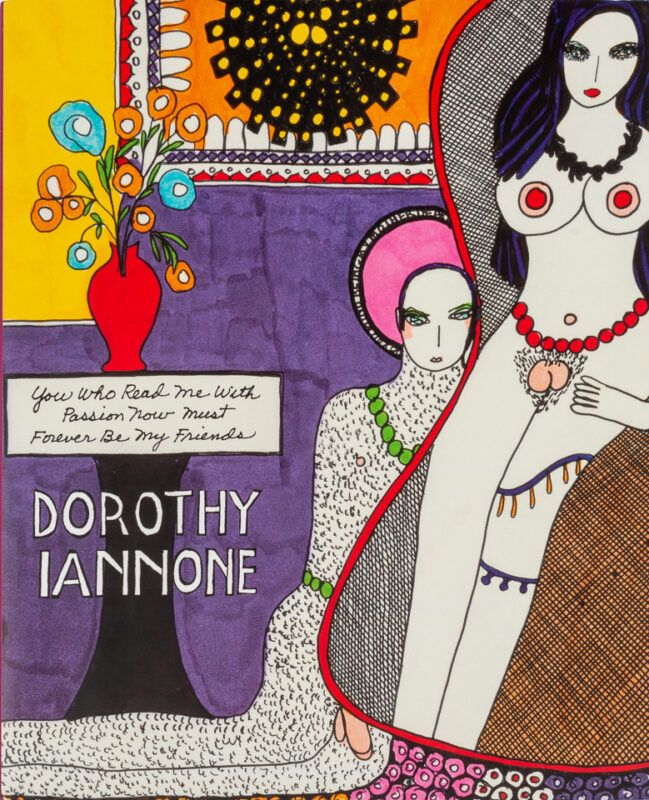What Is Now Known Was Once Only ImaginedAn (Auto)biography of Niki de Saint Phalle
Nicole Rudick

hardcover, 8 × 10 in.
268 pages, full color
978-1-938221-31-6
published in 2022
First edition
Known best for her exuberant, often large-scale sculptural works that celebrate the abundance and complexity of female desire, imagination, and creativity, Niki de Saint Phalle viewed making art as a ritual and a performance—a process connecting life to art. This unconventional, illuminated biography, told in the first person in Saint Phalle’s voice and her own hand, dilates large and small moments in Saint Phalle’s remarkable life as an artist who pointedly challenged taboos.
In a kind of collaboration with the artist, Nicole Rudick has assembled a gorgeous and detailed mosaic of Saint Phalle’s visual and textual works from a trove of paintings, drawings, sketches, and writings, many rare or previously unpublished. These confessions, declarations, meditations, and musings trace the most intimate contours of Saint Phalle’s life. In some works, Saint Phalle articulates herself with startling candor and self-examination; in others, she carefully and slowly unwinds her secrets as she herself wrestles with them. Throughout, her agency in telling her own story is paramount.
What Is Now Known But Was Once Only Imagined is an erudite, insightful, and generous construction of Niki de Saint Phalle’s life that, despite the recognizability of her work, has remained mostly obscured, until now.
read
an excerpt at the Yale Review
and interviews with Rudick by Sam Stephenson at Air/Light and Jessica Bond at FF2
about the artist
Born in France, NIKI DE SAINT PHALLE (1930–2002) was raised in New York and began making art at age twenty-three. Self-taught and prolific, she pursued a revelatory vision informed both by the monumental works of Antonin Gaudí and the Facteur Cheval and by aspects of her own life. In addition to her Tirs (“shooting paintings”) and Nanas and her celebrated large-scale projects—including the Stravinsky Fountain at the Centre Pompidou, Golem in Jerusalem, and the Tarot Garden in Tuscany—Saint Phalle produced a major body of writing and works on paper that delve into her own biography: childhood and her break with her traditional family, marriage to Harry Mathews, motherhood, a long collaborative relationship with Jean Tinguely, creative support from the curator Pontus Hultén, numerous health crises, and her late, productive years in Southern California. Retrospectives of her work have been most recently organized at MoMA/P.S.1 and the Menil Collection.
about the author
NICOLE RUDICK is a critic and an editor. Her writing on art, literature, and comics has been published in the New York Review of Books, the New York Times, the New Yorker, Artforum, and elsewhere. She was managing editor of The Paris Review for nearly a decade. She is the editor of a new edition of Gary Panter’s legendary comic Jimbo: Adventures in Paradise (New York Review Comics, 2021).
press
As readers, we inhabit [Saint Phalle’s] consciousness—we grow and process with her. This is the greatest strength of What Is Now Known: It offers an intimate emotional portrait—an experiential biography, you might say—of Saint Phalle.
—Jillian Steinhauer, The Nation
The narrative that Rudick presents is frank and unsparing, starting with the child Niki, who wanted to be half woman, half man, eschewing any fixed identity, and was aware very early on that she was born into a man’s world.
—Bruce La Bruce, BOMB
What Is Now Known also clarifies editing as a creative act rather than a definitive one. Saint Phalle wrote nothing for this book, and yet this book is written by her. Embracing that contradiction, Rudick enables the artist to speak for herself, as herself, once again.
—Jennifer Krasinski, Bookforum
More reviews in Contemporary Art Review LA, Frieze, Hyperallergic, Los Angeles Review of Books, New York Times T Magazine, Publishers Weekly, Vanity Fair.
more
Nicole Rudick in conversation with Ruth Franklin at 192 Books, and with Dan Nadel at the Leon Levy Center for Biography at CUNY, both video recordings of live events. She speaks with Yann Perreau on the Big Table podcast, too.
Nicole Rudick writes about her unconventional grandmother and the serendipitous discovery of their love of Saint Phalle’s work at Oprah Daily.
Steve Heller interviews publisher Lisa Pearson on The Daily Heller at PRINT Magazine about the book and the process of publishing it.
see also
✼ affinities:
“I can not understand how you … would publish such filth. The book cost $39.95. This was not works of art.”
[...]
